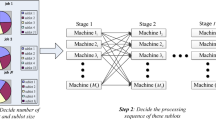Abstract
In this study, we propose a genetic algorithm (GA) for the economic lot scheduling problem (ELSP) under extended basic period (EBP) approach and power-of-two (PoT) policy. The proposed GA employs a multi-chromosome solution representation to encode PoT multipliers and the production positions separately. Both feasible and infeasible solutions are maintained in the population through the use of some sophisticated constraint handling methods. Furthermore, a variable neighborhood search (VNS) algorithm is also fused into GA to further enhance the solution quality. The experimental results show that the proposed GA is very competitive to the best performing algorithms from the existing literature under the EBP and PoT policy.
Access this chapter
Tax calculation will be finalised at checkout
Purchases are for personal use only
Preview
Unable to display preview. Download preview PDF.
Similar content being viewed by others
References
Hanssmann, F.: Operation Research in Production and Inventory. Wiley, New York (1962)
Bomberger, E.E.: A dynamic programming approach to a lot size scheduling problem. Management Science 12, 778–784 (1966)
Elmaghraby, S.E.: The Economic Lot Scheduling Problem (ELSP): Review and Extensions. Management Science 24, 587–598 (1978)
Sun, H., Huang, H., Jaruphongsa, W.: The Economic Lot Scheduling Problem under Extended Basic Period and Power-of-two Policy. Optimization Letters 4, 157–172 (2010)
Chatfield, D.: The Economic Lot Scheduling Problem: a Pure Genetic Search Approach. Computers and Operations Research 34, 2865–2881 (1987)
Sun, H., Huang, H.C., Jaruphongsa, W.: A Genetic Algorithm for the Economic Lot Scheduling Problem under the Extended Basic Period and Power-of-two Policy. CIRP Journal of Manufacturing Science and Technology 2, 29–34 (2009)
Gen, M., Cheng, R.: Genetic Algorithms and Engineering Design. Wiley Series in Engineering Design and Automation. John Wiley & Sons, Chichester (1997)
Coello, A.C.: Theoretical and Numerical Constraint-Handling Techniques Used with Evolutionary Algorithms: A Survey of the State of the Art. Comput. Methods Appl. Mech. Engrg. 191(11-12), 1245–1287 (2002)
Deb, K.: An Efficient Constraint Handling Method for Genetic Algorithms. Computer Methods in Applied Mechanics and Engineering 186, 311–338 (2000)
Takahama, T., Sakai, S.: Tuning Fuzzy Control Rules by the α Constrained Dethod Which Solves Constrained Nonlinear Optimization Problems. Electronics and Communications in Japan, Part3: Fundamental Electronic Science 83(9), 1–12 (2000)
Mladenovic, N., Hansen, P.: Variable Neighborhood Search. Computers and Operations Research 24, 1097–1100 (1997)
Haessler, R.: An Improved Extended Basic Period Procedure for Solving the Economic Lot Scheduling Problem. AIIE Transactions 11, 336–340 (1979)
Khouja, M., Michalewicz, Z., Wilmot, M.: The Use of Genetic Algorithms to Solve the Economic Lot Size Scheduling Problem. European Journal of Operational Research 110, 509–524 (1998)
Park, K.S., Yun, D.K.: A Stepwise Partial Enumeration Algorithm for the Economic Lot Scheduling Problem. IIE Transactions 16, 363–370 (1984)
Fujita, S.: The Application of Marginal Analysis to the ELSP. AIIE Transactions 10(4), 354–361 (1978)
Author information
Authors and Affiliations
Editor information
Editors and Affiliations
Rights and permissions
Copyright information
© 2012 Springer-Verlag Berlin Heidelberg
About this paper
Cite this paper
Bulut, O., Tasgetiren, M.F., Fadiloglu, M.M. (2012). A Genetic Algorithm for the Economic Lot Scheduling Problem under Extended Basic Period Approach and Power-of-Two Policy. In: Huang, DS., Gan, Y., Gupta, P., Gromiha, M.M. (eds) Advanced Intelligent Computing Theories and Applications. With Aspects of Artificial Intelligence. ICIC 2011. Lecture Notes in Computer Science(), vol 6839. Springer, Berlin, Heidelberg. https://doi.org/10.1007/978-3-642-25944-9_8
Download citation
DOI: https://doi.org/10.1007/978-3-642-25944-9_8
Publisher Name: Springer, Berlin, Heidelberg
Print ISBN: 978-3-642-25943-2
Online ISBN: 978-3-642-25944-9
eBook Packages: Computer ScienceComputer Science (R0)




